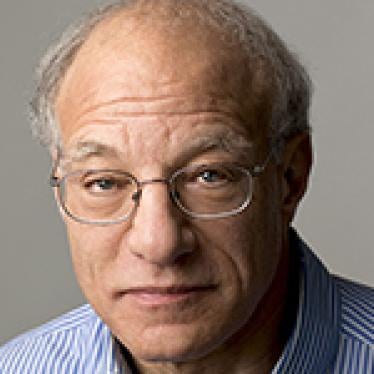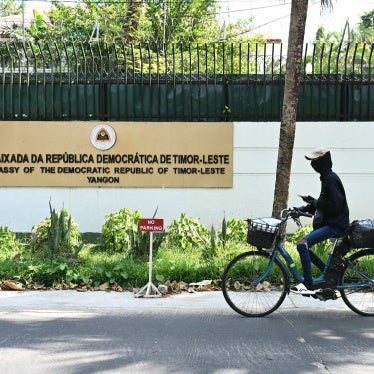The Biden administration’s move to rescind former President Trump’s punitive sanctions against the International Criminal Court (ICC) prosecutor is a positive step, but it in no way resolves the difficult and complex relationship between Washington and the court.
The ICC, created in 1998 to investigate and prosecute those believed responsible for genocide, crimes against humanity and war crimes, has faced intense opposition for two decades from those who fear accountability. Its mandate created the possibility of prosecution, under well-defined circumstances, of people from countries (including the U.S.) that had not joined the court. This has offended senior officials in Washington and may be why the executive order was not among the initial flurry of orders that President Biden reversed during his first few days in office.
But a series of joint statements of support for the ICC by dozens of countries after the Trump administration unveiled its order in June 2020 demonstrate why it was in the U.S. interest to repeal it, despite strong U.S. opposition to two of the court’s inquiries. While the international outcry didn’t pack much influence with the Trump administration, the terrain changed qualitatively in Washington following Biden’s election. The closest U.S. partners signaled in their statements of support that they view the ICC — even with its evident performance shortcomings — as an important component of the world’s multilateral architecture.
Two actions by the court had triggered the attention of the Trump administration. Two years ago, the ICC Appeals Chamber cleared the way for the prosecutor, Fatou Bensouda, to open an investigation into crimes in Afghanistan. This investigation principally focused on alleged offenses by the Taliban, Afghan armed forces and allied militias, but also aimed to explore allegations of torture by U.S. personnel. In January 2020, Bensouda asked the court’s judges to confirm the scope of the ICC’s mandate in Palestine, which would open the way for addressing international crimes by Palestinians and by Israel against Palestinians.
The type of sanctions issued in September against Bensouda and Phakiso Mochochoko, a senior member of her staff, are regularly used by the U.S. to penalize drug kingpins, serious human rights abusers and terrorists — not prosecutors trying to hold to account those responsible for crimes against humanity. Though sanctions at times can be politically motivated and counterproductive, in the right circumstances they can be an effective tool to punish human rights abusers, particularly in situations where there has been little or no criminal accountability. But here those purposes were cynically warped in service of a unilateralist agenda.
The Biden administration decided to remove these sanctions for several reasons, including their noxious nature. There is also the inability of Washington to credibly champion accountability while simultaneously penalizing the ICC prosecutor. But the repeal is most likely linked to the numerous expressions of political support by ICC member states. After the Trump administration announced its order last June, the European Union and several national governments made individual statements in support of the court. Sixty-seven ICC member countries, including key U.S. allies, signed a joint statement of “unwavering support for the court as an independent and impartial judicial institution.”
Following former Secretary of State Mike Pompeo’s “designation” of Bensouda and Mochochoko to be sanctioned, the European Union, several national governments and nongovernmental groups once again spoke out. This time, with Germany taking the lead, 74 countries jointly reaffirmed their support for the ICC as a court of last resort — stepping in only when national courts fail to do their job — in a statement delivered before the United Nations General Assembly on Nov. 2. This was a straightforward rejection of the U.S. attempt to undermine the court.
Similarly, in November, following a regularly scheduled virtual briefing by the prosecutor to the U.N. Security Council on her investigation in Libya, Belgium issued a statement on behalf of all ICC member states in support of the court. In Washington, at about the same time, a number of ambassadors from ICC member countries sent a letter to the State Department relaying their opposition to the sanctions.
On taking office, Biden quickly announced U.S. reengagement with the Paris Agreement and the World Health Organization, multilateral institutions that Trump had shunned, and indicated the administration was “thoroughly reviewing” the sanctions against the ICC. Their subsequent repeal is an initial step; the Biden team needs to work out a modus vivendi with the ICC that respects the rule of law and assists the court’s efforts for justice as widely as possible.
There are essential lessons to be drawn from the diplomatic activism against Trump’s executive order. These are relevant now, not for some time in the future. In the court’s mission to limit impunity for the worst crimes by investigating situations in countries with both strong and weak governments, it is bound to give rise to intense political backlash. That has occurred three times in the court’s 20 years — and it’s happening again, with a backlash against the decision to move ahead with the Palestine investigation. It has included ugly threats against the court and its staff, and a suggestion that Bensouda be prosecuted.
An assault on the ICC and its staff is dangerous, risking more than justice for Israeli and Palestinian victims. If successful, pressure against the court’s involvement would undermine the independence of the prosecutor to pursue investigations where the law and evidence lead. Ultimately, it could warp the application of international criminal law.
The prosecutor has called on member states to stand in defense of the court and its staff, and given the reaction to the Palestine investigation, the need for concerted diplomatic action appears to be urgent. The ICC must be able to prosecute alleged criminal acts by powers big and small, undemocratic and democratic. Given the global offensive against respect for the rule of law by authoritarian leaders and the proliferation of mass atrocities, the need for this court to function beyond the political will of a few powerful states is more necessary than ever.
For those who created the court and have advocated for these goals, now is the time to defend them. The court will be subject to ongoing threats and its defenders must continue to be vigilant.









